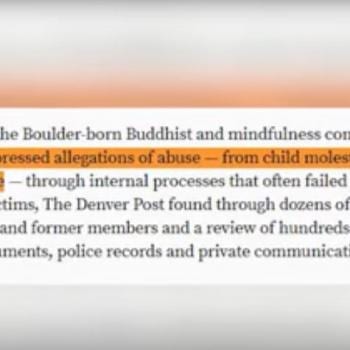
A common interpretation of karma is that “what goes around, comes around.” Or, in other words, your actions now will form the world you inhabit in the future. Logically, then, the world you inhabit now is a product (or at least influenced by) your past actions.
Understanding just how we can think of this concept today was a major issue in the recent Contemporary Buddhist Ethics conference. There seem to be two extremes in how we can understand karma today:
- The “Law of Attraction” idea, whereby we can almost magically ‘manifest’ anything and everything into our world. This is an extremely popular idea in contemporary Western society (endorsed by Oprah, no less) and, most scholars would say, an extremely pernicious idea. It is harmful, scholars say, because it puts too much blame for individual suffering on the individual: a suicidal depressive just needs to “think happier thoughts” or a starving child in Africa must have been too greedy in a past life.
- The second view of karma, being popularized by many of those same academics, is the idea that karma is ‘just’ a folk psychology term for what could be otherwise attributed to neural wiring/rewiring. In other words, behaving in X manner conditions your brain to continually act in that manner. Combine that with a perhaps Darwinian or Virtue ethics theory of society and you can discuss how socially or biologically destructive activities are labeled ‘bad’ and tend to lead one to a miserable life, and vice versa. However, this view is at fault from a doctrinal stance because, by relegating karma strictly to the brain, it dismisses rebirth.
In any case, the Buddha taught that having ‘right view’ regarding karma was the first step on the noble eightfold path to awakening. As Richard Gombrich states, “When one introduces the Buddha’s teaching to a modern audience, one very often stresses at the outset — as indeed I have done — that he asked people to use their own judgement, to go by their own experience and to take nothing on trust. One soon has to qualify this, however, by saying that there was one belief which he held himself and relied on in his teaching, the belief in the law of karma; and if that was not to be obviously falsified by every cot death, it had to entail belief in rebirth.” (pp.27-8 of What the Buddha Thought)
While the exact workings of karma is an ‘unthinkable’ (something that is of a nature that is necessarily beyond theoretical reason or conceptual categories), a certain ‘faith’ in its overall mechanism seems fundamental to Buddhist ethics. I hope to make clear in future posts why I think this is analogous to Kant’s ‘faith’ in God and the immortal soul – two things he claimed were beyond knowledge yet necessary from a moral point of view. But that can wait.
For now, let me turn your attention away from Buddhism and Kant, toward an interesting recent study claiming that ethical people are more happy. While it is hardly conclusive, it will hopefully open doors for further, more detailed, studies. And it does agree with certain intuitions most of us have about “old curmudgeons” – that their rotten attitude and behavior probably feeds their unhappiness, while sweet, friendly, positive people tend to attract a certain amount of positive people and circumstances in to their lives (thus reinforcing that positive attitude).
But aren’t these the same intuitions that feed the “Law of Attraction” industry and so deeply irritate skeptics? I think not. Because it should also be obvious to any thinking person that our happiness isn’t purely a matter of internal, subjective states. Given the right circumstances, any one of us can be made pretty miserable. And we can be made – by our situation – to act either more morally or immorally. Philosopher Kwame Anthony Appiah has coined the term situationism to highlight the importance of this (not to be confused with Fletcher’s Situation Ethics). As he states, “Virtue theorists have sometimes directed us toward an excessively inward model of self-development; situationism returns us to the world in which our selves take shape.” (p.71 of Experiments in Ethics) If you don’t believe or understand how our situation can radically shape our ethics, in even a very short period of time, check out the Stanford prison experiment.
But this isn’t to side with social (or other) determinists. One of the most interesting upshots of situationism is that we are responsible for our circumstances just as much as we are responsible for how we act in those circumstances. So if we’re in a bad romantic relationship, it’s not just that we should “think happy thoughts” or visualize our partner as suddenly becoming a new, better person. Our being miserable is conditioned by the situation. Get out of it and voila, the world might just look a lot cheerier. I’ve seen this countless times in my own life and in friends and family. There is a very complex, shall we say ‘unthinkable’, interrelationship between one’s own reactions/mental attitude and one’s situation. Yes, changing your thoughts may actually fix an external situation – such advice is sometimes perfect. But at other times, you need to fix the situation itself, and the happy thoughts will follow.
But all of that is in support of the idea that you should be happy. You should work on inner states of contentment and loving-kindness. And you should regularly check to see that the world you put or find yourself in (friends, partners, jobs, etc) supports happiness and positive ethical behavior.
From another article on happiness:
Findings in positive psychology show that you would significantly enhance the welfare of the others around you if you felt you were happy. There are at least three reasons why your happiness promotes others’ welfare. First, happy people are more generous (e.g., you would be more willing to help others when you are happy), and this means that the others benefit from your altruism. Second, research on emotional contagion shows that, through mimicry, others tend to reflect our emotions, which means that when we are happy, we make others happy through contagion. Finally, happy people are more productive (they work harder) and less needy (e.g., they are less likely to fall sick); hence, happy people both offer more and soak up less resources.
PS. for a lively, fun, and dynamic discussion of Happiness from someone who knows it well (and arguments against it), see Happiness: A Guide to Developing Life’s Most Important Skill by Matthieu Ricard.











